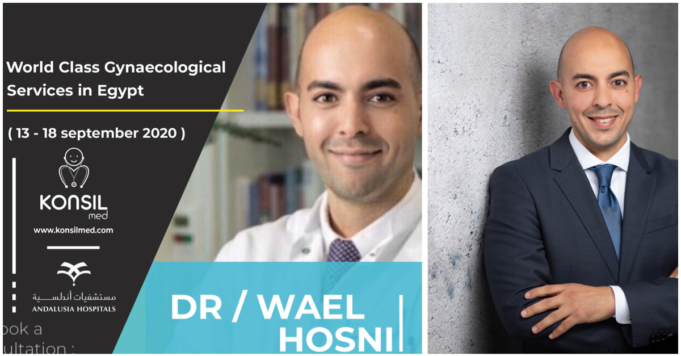Doctor Wael Hosni is a German-Egyptian consultant of Obstetrics and Gynecology living in Germany and practicing in Marienhospital – a teaching Hospital of Cologne University.
His areas of expertise include the fields of minimally invasive gynecological surgery (laparoscopic surgery), urogynecology and pelvic reconstructive surgery.
He will be visiting the Andalusia Hospital in Alexandria, Egypt between September 13th and 18th as a visiting expert in order to consult patients and perform surgeries.
This visit is being organized in collaboration between the renowned Andalusia Hospitals in Egypt and Konsilmed, an international healthcare services company based in Germany.


We had the chance to interview Dr. Wael Hosni and learn all about what he had planned for his visit, as well as indulge in a fruitful conversation about breaking the taboos when it comes to women’s health in Egypt and more!
1- The aim of the visit is to offer world class medical service in Egypt; can you elaborate on how exactly you are hoping to do that?
Our commitment as doctors is to provide quality healthcare for all patients everywhere and offer individualized approaches in managing each patient – before, during, and after their visits.
Before I elaborate on this, I must say that Egypt has no shortage of very competent doctors and quality medical facilities. What we try to do with such visits is attempt to benefit patients by adding something to the already-available medical system, for example: introducing new surgical techniques or new treatment methods that we routinely perform in Germany.
Such surgeries may be less invasive for patients but have equal or better outcomes than the traditional surgeries. Unfortunately, they are not yet widespread in Egypt – either due to lack of the necessary training or the high costs of the necessary equipment. We’ll be using very efficient and modern surgical equipment that help in facilitating the procedures and reducing operative time.
The visit will also be a good chance to exchange opinions, knowledge and experiences with colleagues in Egypt and I’m definitely looking forward to that.
2- About urinary incontinence and breaking the taboo, do you think Egyptian women could ever start opening up about such problems without holding back due to the shame or embarrassment we often hide behind?
Urinary incontinence is the involuntary loss of urine. Speaking openly about incontinence and seeking medical advice is essential for living life to the full in spite of this often debilitating condition.
The problem shouldn’t be linked only to Egyptian women as it applies to women everywhere. Women who suffer from involuntary loss of urine often feel uncomfortable to talk about the issue – not only with family and friends, but also with their own doctors.
The taboo around urine leakage is hard to overcome and incontinence is a very common medical condition. It’s estimated that one in three women will have a urine leakage at some point. This means that more women suffer from incontinence than asthma and diabetes combined.
It’s the role of the medical care providers, media, and governments to initiate awareness campaigns for patients. We should deliver the message that modern medicine has much to offer for those patients and that cure rates could reach up to 90% with the proper treatment.
I encourage every woman with incontinence not to suffer in silence and to seek an expert’s opinion. Thankfully, we have a wide range of conservative and surgical options to treat the problem so that women can lead full, active and satisfying lives.


3- Speaking of the shame that could lead so many Egyptian women to risk their health and wellbeing; can you talk to us in more detail about what you call ‘the silent epidemic’?
Pelvic Organ Prolapse is another very common medical condition. It occurs when the muscles and ligaments of the pelvis weaken so they can no longer support organs like the bladder, uterus and rectum. These organs end up dropping and women start complaining of symptoms that get worse with time.
Studies suggest that around 30% of females have some sort of organ prolapse. Women’s own confusion and lack of awareness around the symptoms coupled with that feeling of shame often prevent them from seeking help – which is why we call it the silent epidemic.
Another problem is that even when prolapse patients seek help from their local doctors, symptoms are often dismissed as being `not too bad`. This highlights the fact that there is a gap, indeed, in the care and services offered to patients with prolapse.
More awareness for patients is key to reduce the impact of this medical condition. Advanced training for doctors to diagnose and efficiently treat such conditions is also essential.


4- For those who don’t know, what exactly is Laparoscopy, what goes into the process, and why do you think this is ‘the era’ of it?
Laparoscopy is one of the best inventions in the modern surgical world and it’s my passion. Laparoscopy has gained a leading role and is now the gold standard in Germany for quite a wide range of gynecological procedures.
Traditionally, most gynecological surgeries were done through an open approach – in other words, `large incisions`. These open surgeries involve creating an incision to open the patient and remove diseased tissue or organs. Such surgeries are usually associated with more blood loss, delayed recovery, bad cosmetic outcomes, higher risk of complications, and longer hospital stay.
In laparoscopic procedures, we make very small incisions to insert instruments and perform the entire surgery under camera guidance. Patients are usually discharged from the hospital on the same day or the next at most. The prospect of a shorter recovery is alluring to many women who find it difficult to take time away from their families and professional responsibilities.
Another advantage is that patients are left with tiny scars that are hardly visible to the eye. With regards to the financial issues, I would say that the costs of laparoscopic surgery are most of the time lower than that of open surgery. This is mainly because patients do not have to pay for a prolonged hospital stay.
The bottom line here is that both open and laparoscopic surgeries are associated with a unique collection of benefits and risks. We perform most surgeries in Germany through minimal invasive techniques. This is great for patients, however, not easy to achieve everywhere.
In order to achieve the desired outcomes, you need experienced laparoscopic surgeons, efficient training for younger doctors and quality surgical equipment to use. Returning to our original question: is it the era of laparoscopy? My answer is a definite yes.
5- What are you looking forward to accomplishing during your visit and what specific impact would you want to make and leave behind as a fixed change?
I am very happy to be coming to Egypt soon as a visiting expert in the well-known Andalusia Hospital. My goal is simply to help patients in the best possible way. Leaving a positive impact on the lives of those patients would be the best outcome for my visit.



















